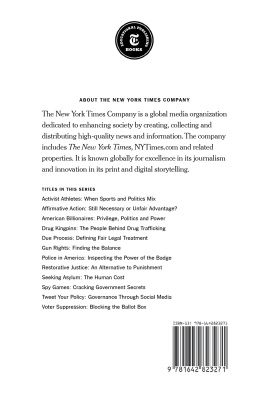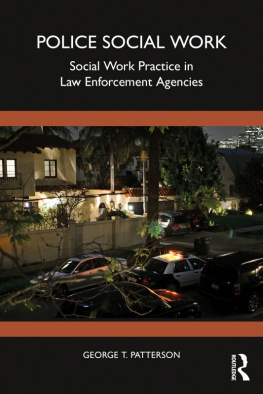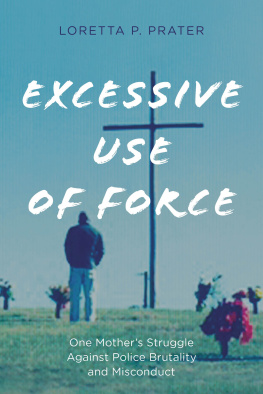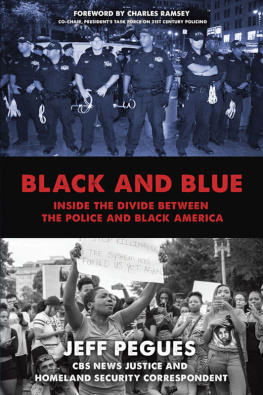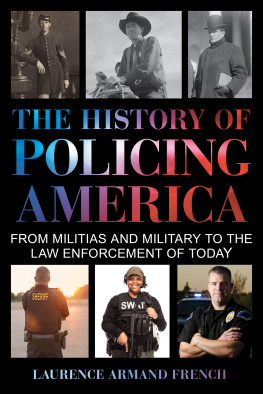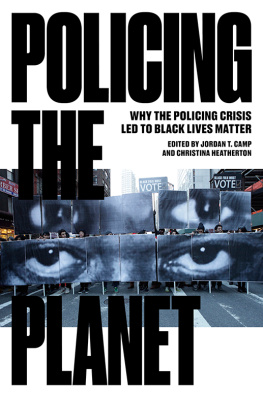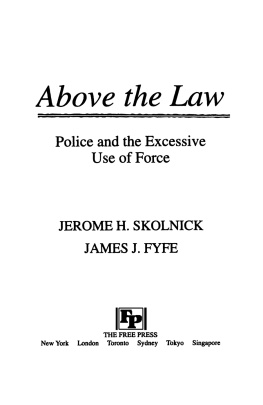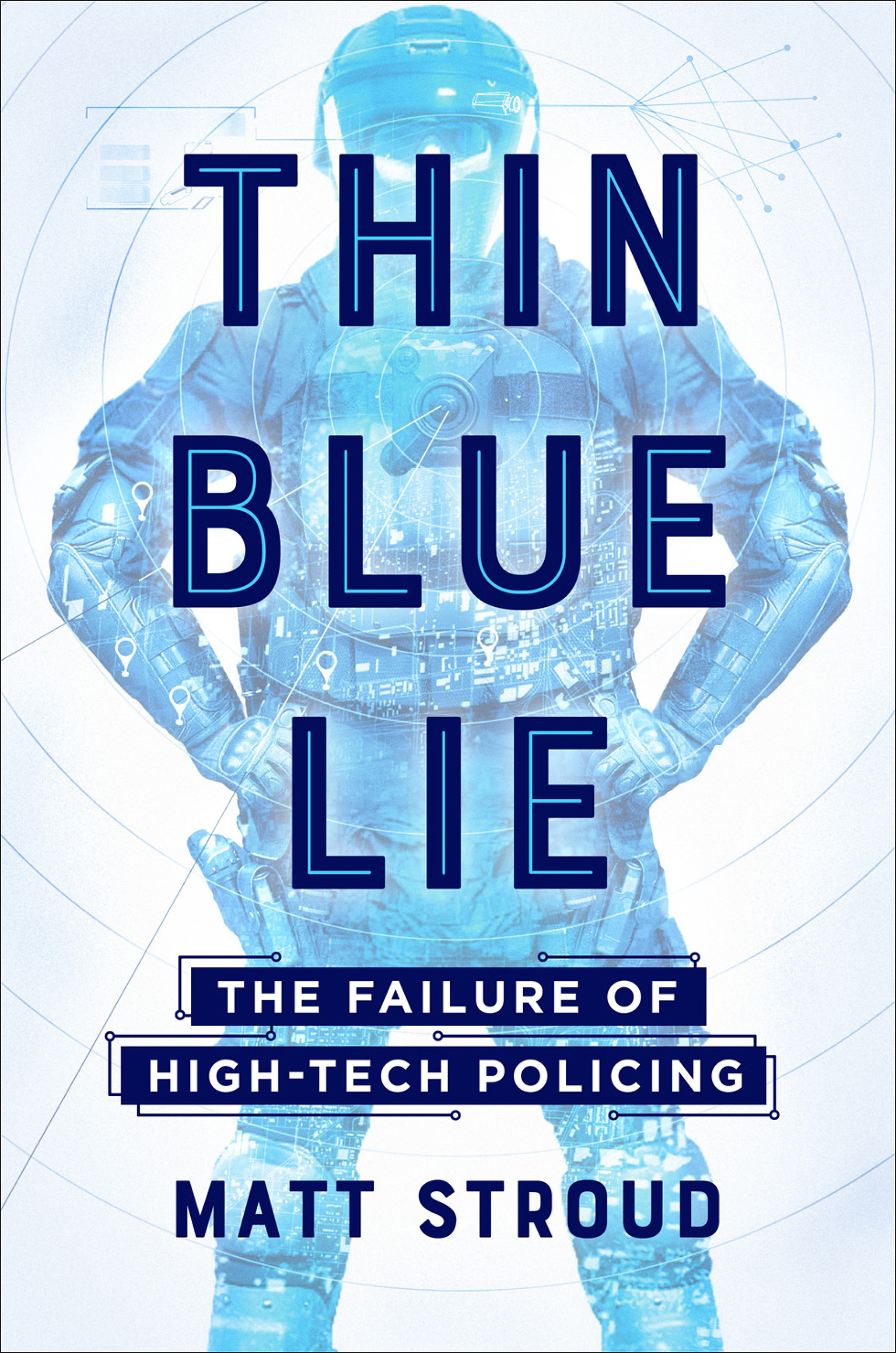The author and publisher have provided this e-book to you for your personal use only. You may not make this e-book publicly available in any way. Copyright infringement is against the law. If you believe the copy of this e-book you are reading infringes on the authors copyright, please notify the publisher at: us.macmillanusa.com/piracy.
Police work is largely a game of bluff.
In addition to working a full-time job of her own, my wife, Kylie, allowed me the time during early morning hours, late nights, and weekends to read, write, and take over our homes basement. Kylie nurtured two of our very energetic kids, Evy and Coriand gave birth to a third, Charliewhile I wrote this book. There is no way that it would have come into existence without her patience and love and support. Thank you, Kylie.
Thank you, also, to my parentsNancy and David Stroudwho offered counsel as I rambled on and on during Sunday morning breakfasts about policing cultures and technologies that, Im sure, couldnt have been further away from their interests.
Kylies parents, Nancy and Tom Butler, and her siblings, Matt and Marissaand their wonderful spouses and childrenalso helped to make our lives joyful.
Thanks to Jesse Hicks, too, who is perhaps the smartest writer, editor, and thinker Ive had the privilege of meeting and calling a friend. He assisted with interviews surrounding the Tasers early history and helped to scan hundreds of documents, drawings, and contracts in the San Clemente garage of Ginny Cover, Jack Covers widow. Ginny was exceedingly generous with her time and with her recollections about Jack, his personality, and his work developing his most famous inventionclearly one of dozens he developed over decades in his garage. Thank you, Ginny.
The filmmaker Nick Berardini helped to conduct some of the interviews in this book and taught me a lot of what I know about Taser International and Axon Enterprise through his incredible documentary film Killing Them Safely and his general knowledge and dogged investigative reporting. Nick also connected me to Matt Masters, a cop with the Kansas City Police Department who is the kind of cop everyone should knowsomeone whos thoughtful and empathetic and wants to do right by the people he serves and protects. Matts son, Bryce, is still recovering from a Taser shock that nearly killed him, and his wife, Stacy, helps to keep their family centered. The entire Masters family has been inspirational throughout my reporting on this project.
Lauren Sharp, a phenomenal agent with writing chops that far exceed mine, helped to mold a vague idea into a solid book proposal and usher it to life. Her guidancealong with the guidance of her colleagues at Aevitashas been indispensable.
Connor Guy, my editor, made this book happen. Hes been my closest writing confidant throughout this process and knows more about my tendencies in print than anyone. If you need an editor, hes who you want in the role. Thank you to Connor and to Metropolitan Books for taking a chance on a first-time author.
Thanks also to CityLabs Brentin Mock for guidance and knowledge, and to Carmen Gentile for friendship and letting me borrow your motorcycle indefinitely. Thanks to Mila Sanina and Halle Stockton at PublicSource for supporting investigative journalism in Pittsburgh; Josh Dzieza and Michael Zelenko at the Verge for publishing Official Police Business; Stephen Greenwood for not getting Tasered in Scottsdale; Kevin Friess for being a good cop and a great friend; Rick Smith and Steve Tuttle for making my job interesting; Roger Hodge at the Intercept for supporting an odd journalistic collaboration; and Esther Kaplan at the Investigative Fund for being open to just about any pitch from any eager journalist.
And thanks to Evy, Cori, and Charlie for being goofballs and for making every day worth living.
You hear a click, like the sound of a light switch or a pencil being snapped.
Youre facing away from it, looking straight ahead, just as instructed. The click and the searing pain you feel are nearly instantaneous, but your mind tricks you into thinking that theres a distinct period between the click and your first realization that somethings gone very wrong. Maybe thats because your shooterfriendly and supportive, congratulatory, even, somehow impressed that you were dumb enough to have volunteered for thishas prepared you for it, warned you that a pain like no other is about to strike you.
So you just stand there, waiting for it, on the wrong side of target practice.
When it hits you, no matter how much you expect it, it comes as a surprisea literal shock, like a baseball bat swung hard and squarely into the small of your back. That sensation, which is actually two sharp steel barbs piercing your skin and shooting electricity into your central nervous system, is followed by the harshest, most violent spasm you can imagine coursing through your entire body. Needles everywhere, overwhelming you. With the pain comes the terrifying awareness that you are completely helpless. You cannot move. You lose control of almost everything and the only place you can go is down, face first to the floor.
THE WHOLE THING lasted five secondsbut it felt like an eternity.
I had just spent several hours interviewing employees in the Scottsdale, Arizona, headquarters of the wildly successful, publicly traded company that makes Tasers, the black-and-yellow electroshock devices. At the time, the company was called Taser International. Just a few years earlier, Tasers had become Internet famous when a college student was filmed shouting Dont taze me, bro! at a university police officer in 2007. Like many who saw that viral video, I hadnt taken the weapons very seriously.
But on my way out of the building, the companys main press officer asked me, Do you want to take a ride?
He was asking if I would voluntarily subject myself to being shocked by the companys signature product. It was typical, he claimed, for anyone visiting Taser Internationals massive, futuristic desert compound to get a taste of what Tasers all about.
Maybe it was the hot desert air. Maybe it was the fact that Id never read or heard a good explanation of what it feels like to be shocked with a Taser. Whatever the reason, I agreed to play along.
AS SOON AS it was over, I began to ask myself for the first time: Is a weapon this powerful really necessary for police to do their work safely?
Many cops would say yes, of course: the purpose of Tasers is to disable and immobilize unruly suspects. Tasers give police another option that is less likely to kill someone than a gun. Tasers make police safer. But as I looked deeper into Taser International, this reasoning seemed flimsier and flimsier.
I soon came to see that this was just one example of many in which police put their total faith in technology, expecting it to solve the massive, seemingly intractable problems inherent to their work. Weve seen this same kind of blind optimism concerning body cameras, Compstat, predictive policing, cell phone trackers, and even surveillance cameras. Leaving aside the important privacy concerns that have been raised about some of these technologies, in many cases they simply dont do what theyre supposed to do. And more often than not, the technologies have turned out to be expensive stopgaps that give the police a sheen of forward-thinking pragmatism while in fact steering them away from the kinds of fundamental reforms that could make a real difference. How did police come to trust technology so fervently? And what role has technology played in pitting them against the communities theyre supposed to serve and protect?


